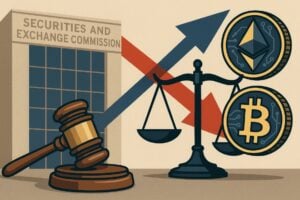Stop all Trump tariffs on appeal: Coinbase revives the “major questions” against the SEC

A federal verdict challenging the tariffs imposed by Donald Trump reignites the clash over crypto regulation.
The chief legal officer of Coinbase, Paul Grewal, interprets the appellate decision of August 30, 2023 (source: Reuters) as a useful precedent to limit the scope of the regulatory power of the SEC in the absence of a clear mandate from Congress.
Industry analysts note that the doctrine of “major questions” has been invoked more frequently in federal court rulings in recent years, becoming a favored argumentative framework in challenges against broad regulatory acts.
According to public reconstructions of available briefs and hearings, textual and historical arguments are often decisive in the preliminary stages of administrative disputes.
This direct experience in monitoring cases shows how procedural risks quickly translate into political pressure for clarifying legislation. To delve deeper into crypto regulation and judicial disputes, consult the legal tech and crypto regulation section of our site.
In this article: The appeal decision on IEEPA • The Coinbase parallel • The “major questions” doctrine • Effects on Coinbase vs SEC • Reactions and the SEC’s standpoint • Impact on the sector • Essential timeline • Legislative scenarios • Documents and sources
- Key point: the court of appeals, according to Reuters, held that the IEEPA does not authorize generalized tariffs without explicit delegations from Congress.
- Why now: Coinbase invokes the same principle to challenge the extension of the intervention scope of the SEC on crypto.
- What changes: more pressure on the legislator and new uncertainty due to “ambitious” regulatory interpretations.
The appeal decision on IEEPA and tariffs: the scope of executive power
A federal appeals court has determined that the use of the International Emergency Economic Powers Act (IEEPA) to impose large-scale tariffs lacks historical foundation and adequate textual support. In the absence of a specific delegation from Congress, economic measures of such wide impact cannot be introduced by the Executive.
It must be said that the principle affirmed is clear: for far-reaching decisions, explicit authorization is required.
- Historical Motivation: there are no precedents where the IEEPA has been used for generalized tariffs.
- Method: a “textual and historical” interpretation that limits the spaces for regulatory flexibility.
- Practical effects: the decision is subject to further appeals, but it sends a strong signal to all federal agencies.
The parallel drawn by Coinbase: powers of the SEC and boundaries of the “investment contract”
According to Paul Grewal, the appeal motivation reinforces a line already adopted by Coinbase in the dispute with the SEC: the Agency would have expanded over time the notion of “investment contract” to include token exchanges lacking the classic elements provided by the Howey test.
In this context, the extension of jurisdiction over crypto would end up configuring a usurpation of the role of Congress.
The doctrine of “major questions”: why it matters now
The major questions doctrine establishes that, for decisions of significant economic or political impact, agencies must act only on a clear legislative basis, as reiterated by the Supreme Court in West Virginia v. EPA (June 30, 2022).
It is the same principle referenced in the case of tariffs which, according to Grewal, weakens the SEC’s “comprehensive” approach towards crypto. An interesting aspect is the potential domino effect on other regulatory areas.
Implications for the Coinbase vs SEC Case
The appeal reasoning can strengthen Coinbase’s arguments: when the impact is systemic, a law drafted in an unequivocal manner is needed.
Even without resolving the merits of the dispute, the decision adds a legal argument against extensive regulatory interpretations lacking a clear textual basis. That said, on the procedural level, the dispute remains open both in the courts and on the legislative front.
Reactions and Position of the SEC
As of September 1, 2025, there are no official statements from the SEC in direct response to the parallel proposed by Coinbase published on the agency’s website.
In previous public statements, Chairman Gary Gensler has argued that “the majority of crypto tokens are securities” and that the current regulatory framework provides sufficient tools for investor protection, insisting on a rigorous enforcement of existing rules, without outlining a specific regime for digital assets.
Impact on the sector: what to expect immediately
- Increasing legislative pressure: Congress is urged to define a clear framework for digital assets.
- Targeted disputes: the opportunities for operators to challenge regulatory acts based on broad interpretations are increasing.
- Transitory uncertainty: alternative paths of enforcement and regulation are anticipated until new legislative interventions.
Essential Timeline
- June 2023: the SEC sues Coinbase in the federal court of New York (SDNY), initiating a lawsuit regarding the classification of various services and tokens.
- 2023 – ongoing: hearings, briefs, and preliminary motions keep the case at the center of regulatory debate in the USA. For a similar summary of cases and disputes between crypto operators and authorities, see the crypto legal cases section.
- August 30, 2023: a federal appeals court declares most of Trump’s tariffs based on the IEEPA to be illegal (source: Reuters).
- June 30, 2022: the Supreme Court decides West Virginia v. EPA, a decision often cited in the debate on the major questions doctrine.
- End of August 2023: Paul Grewal highlights the connection with the major questions doctrine and the limits of the SEC’s regulatory power.
- As of September 1, 2025: the dispute between Coinbase and the SEC remains in development amid court decision phases and attempts at legislative intervention.
Possible Legislative Scenarios
- Perimeter definitions: the adoption of a law that clarifies which assets fall under the jurisdiction of the SEC compared to other authorities.
- New digital architecture: the creation of a regulatory framework dedicated to digital markets, aimed at distributing competencies among multiple agencies (e.g., SEC, CFTC), to reduce litigation. For more on the role of CFTC and other agencies, also read the overview on US fintech regulations.
- Prolonged status quo: without Congressional intervention, the regulatory “void” persists, leaving rules to the discretion of the courts and enforcement bodies.
Context and Critical Reading
The contrast between Coinbase and the SEC is not just technical: it highlights the balance between legislative power and independent agencies. The ruling on fees reaffirms the principle of democratic accountability in decisions with significant economic impact.
Should Congress intervene with a market structure bill, the sector could benefit from greater certainty; in its absence, regulation will remain subject to court decisions and case-by-case interpretations.
Documents and sources
- Reuters — “Most Trump tariffs are not legal, US appeals court rules” (August 30, 2023)
- US Supreme Court — West Virginia v. EPA (June 30, 2022), text of the opinion
Note: At the moment, the official details for a complete citation of the appeal decision (full case name, circuit, and docket number) are not available in the public text. The article will be updated with links to the text of the judgment and court documents when made available by the courts.
You May Also Like

Unlock Your Future: Volunteer at Bitcoin World Disrupt 2025 for Unrivaled Startup Networking

Cardano (ADA) Kurucusu Charles Hoskinson, ADA’nın Geleceği Hakkında Açıklama Yaptı!
